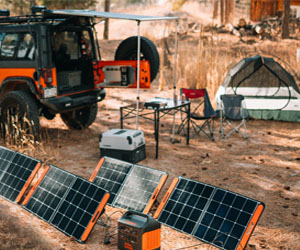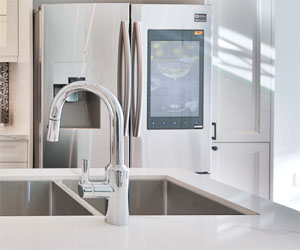


Exploring The Benefits Of Solar Energy

Solar energy, harnessed from the sun's radiant power, has increasingly become a focal point in the quest for sustainable energy sources. It's not just a source of clean power; solar energy offers a plethora of benefits, both for individuals and the planet. In this article, we will delve into the advantages of solar energy and shed light on why it's such a bright prospect for our future.
1. Clean And Renewable Energy
Perhaps the most prominent benefit of solar energy is its clean and renewable nature. Unlike fossil fuels, which release harmful greenhouse gases when burned, solar panels generate electricity without emitting any pollutants. This eco-friendly aspect helps combat climate change and reduces our carbon footprint.
2. Reduced Electricity Bills
Solar panels allow homeowners and businesses to generate their electricity, which can lead to substantial cost savings on their electricity bills. By producing your electricity, you can significantly reduce or even eliminate your reliance on traditional utility providers.
3. Energy Independence
With solar panels on your roof or property, you gain a degree of energy independence. You are less reliant on the grid, which can be especially advantageous during power outages. Solar power systems, combined with energy storage solutions like batteries, can provide a consistent supply of electricity even when the sun isn't shining.
4. Increased Property Value
Homes and commercial properties equipped with solar panels often see an increase in their market value. Solar panels are viewed as attractive assets, and many potential buyers are willing to pay a premium for a property with solar installations.
5. Government Incentives
Many governments worldwide offer incentives, tax credits, and rebates to encourage the adoption of solar energy. These financial perks can make solar installations more accessible and affordable for homeowners and businesses.
6. Low Operating Costs
Once installed, solar panels have minimal operating and maintenance costs. Regular cleaning and occasional inspections are usually all that's needed to keep the system running efficiently. This low-maintenance feature makes solar energy a cost-effective long-term investment.
7. Job Creation
The solar energy industry is a significant source of job opportunities. The installation, maintenance, and manufacturing of solar panels contribute to the creation of numerous jobs, stimulating economic growth.
8. Grid Stability
Solar power, when integrated into the energy grid, can enhance grid stability. Distributed energy generation from homes and businesses can reduce the strain on the grid during peak demand, enhancing overall energy reliability.
9. Technological Advancements
The field of solar technology is continuously evolving, leading to improved efficiency and cost-effectiveness. Innovations such as bifacial solar panels, thin-film technology, and solar tracking systems have further enhanced the benefits of solar energy.
10. Environmental Conservation
The use of solar energy helps conserve natural resources and ecosystems by reducing our dependence on fossil fuels. It also minimizes the harmful impact of mining and drilling for these finite resources.
Solar energy is not just a source of power; it's a beacon of hope for a cleaner, more sustainable future. The numerous benefits it offers, from reducing electricity bills to combatting climate change, make it an increasingly attractive choice for individuals, businesses, and governments around the world. As solar technology continues to advance and become more accessible, the future is looking brighter than ever.


A Healthier, Safer, And Greener Way To Clean
 Health Hazards: Many conventional cleaning products release volatile organic compounds (VOCs) into the air, contributing to indoor air pollution. Prolonged exposure to VOCs can lead to respiratory issues, allergies, and skin irritations.
Health Hazards: Many conventional cleaning products release volatile organic compounds (VOCs) into the air, contributing to indoor air pollution. Prolonged exposure to VOCs can lead to respiratory issues, allergies, and skin irritations.
Environmental Impact: Harsh cleaning chemicals are not eco-friendly. When washed down drains, they can contaminate water systems and harm aquatic life. The production and disposal of these chemicals also contribute to pollution and waste.
Chemical Residue: Residues from chemical cleaners can linger on surfaces, posing long-term health risks, especially in homes with children or pets.
Benefits Of Chemical-Free Cleaning
Healthier Indoor Air: Chemical-free cleaning means cleaner indoor air quality, reducing the risk of respiratory problems and allergies for you and your family.
Reduced Health Risks: Non-toxic cleaning products reduce the risk of skin irritations and other health problems associated with chemical exposure.
Environmentally Responsible: Chemical-free cleaning is gentle on the environment. It doesn't contribute to water pollution, and it reduces the production and disposal of harmful chemicals.
Safer For Children And Pets: Chemical-free cleaning eliminates the risk of harmful chemical residues on surfaces, making your home safer for kids and pets.
Methods Of Chemical-Free Cleaning
Vinegar And Water: A mixture of white vinegar and water can be used to clean glass, countertops, and even sanitize surfaces.
Baking Soda: Baking soda is an excellent abrasive cleaner. It can be used to scrub surfaces, deodorize, and even extinguish small fires.






Embracing Self-Sufficiency And Sustainability
 Key Principles Of The Off-Grid Living Movement:
Key Principles Of The Off-Grid Living Movement:
Self-Sufficiency: At the heart of the off-grid living movement is the desire for self-sufficiency. Off-gridders aim to provide for their own basic needs, such as energy, water, and food, without relying on external infrastructure. They often employ renewable energy sources, such as solar panels and wind turbines, and use water collection and purification methods.
Sustainability: Sustainability is a cornerstone of off-grid living. This lifestyle emphasizes responsible and eco-conscious practices, from recycling and composting to sustainable agriculture and permaculture. Off-gridders typically seek to minimize their ecological footprint and reduce waste.
Resourcefulness: Off-grid living requires resourcefulness. Those who embrace this lifestyle must be creative and adaptive to overcome the challenges of living independently. They often build their homes using natural materials and repurpose everyday items to serve multiple purposes.
Connection With Nature: Off-grid living fosters a deep connection with the natural world. Many individuals who choose this lifestyle opt for remote locations, surrounded by the beauty of nature. They often forage for wild edibles, learn about local ecosystems, and live in harmony with the environment.
Minimalism: Minimalism is a common theme in off-grid living. By reducing the reliance on modern conveniences and material possessions, individuals often discover a simpler and more meaningful way of life.
Community: Contrary to the perception of complete isolation, many off-grid individuals form tight-knit communities where like-minded people come together to share knowledge, resources, and a sense of camaraderie. These communities enable collective development of sustainable practices.
Benefits Of The Off-Grid Living Movement:
Reduced Environmental Impact: Off-gridders significantly lower their environmental footprint. They use renewable energy sources, minimize waste, and employ sustainable agricultural methods, making their lifestyles more eco-friendly.
The Future Of Modern Living
 What Are Smart Appliances?
What Are Smart Appliances?
Smart appliances are traditional household devices, such as refrigerators, ovens, washing machines, and even coffee makers, that are equipped with advanced technology and connectivity features. These features allow them to be remotely controlled and monitored through a smartphone app or voice-activated virtual assistants. Smart appliances can perform a wide range of functions, from adjusting settings to sending notifications and alerts.
Convenience And Efficiency
One of the most significant advantages of smart appliances is the level of convenience they bring to everyday tasks. Imagine being able to preheat your oven on your way home, so dinner is ready as soon as you arrive. Smart appliances enable you to control and monitor their functions from virtually anywhere, giving you more control over your daily routines.
Energy Efficiency And Cost Savings
Smart appliances are designed to be energy-efficient. They often include features like energy-saving modes, remote scheduling, and real-time consumption tracking. For instance, smart thermostats can learn your heating and cooling preferences and create optimized schedules, which not only improve comfort but also save on energy costs. Smart appliances not only benefit your wallet but also contribute to environmental sustainability.
Integration With Smart Homes
Smart appliances are designed to be compatible with other smart home devices and systems. They can seamlessly integrate with centralized home automation hubs, allowing you to control multiple devices from a single app or voice-activated virtual assistant. This interconnected ecosystem enhances the overall smart home experience.
Voice Control
Many smart appliances can be controlled via voice commands through virtual assistants like Amazon's Alexa, Google Assistant, or Apple's Siri.
A Fundamental Right And Social Imperative
 One of the critical challenges in addressing affordable housing is the ever-increasing demand. As more people move to urban centers in search of better economic opportunities, housing markets become strained. Limited supply and increasing demand often result in skyrocketing housing prices, pushing the cost of living beyond the means of many.
One of the critical challenges in addressing affordable housing is the ever-increasing demand. As more people move to urban centers in search of better economic opportunities, housing markets become strained. Limited supply and increasing demand often result in skyrocketing housing prices, pushing the cost of living beyond the means of many.
The consequences of unaffordable housing are far-reaching. Families are forced to live in overcrowded and substandard conditions, leading to health issues and reduced quality of life. Homelessness becomes a tragic reality for some, further exacerbating social problems. Moreover, the lack of affordable housing can perpetuate cycles of poverty, as families are left with limited resources for education, healthcare, and other essential services.
Affordable housing solutions are not only vital for individuals and families; they also have broader social and economic implications. Access to affordable housing can improve community stability, enhance economic mobility, and reduce the burden on social welfare programs. By ensuring that everyone has a place to call home, we create the foundation for stronger, more inclusive societies.
To address the affordable housing crisis, various approaches and strategies are being employed around the world. Government subsidies, tax incentives, and grants can stimulate the construction of affordable housing units. Public-private partnerships are another effective way to harness the resources and expertise of both sectors.
Thriving In Compact Living
 1. Multifunctional Furniture
1. Multifunctional Furniture
One of the key principles of small space efficiency is multifunctional furniture. These pieces serve multiple purposes, allowing you to make the most of every square inch. Sofa beds, fold-out desks, and dining tables with hidden storage are excellent examples. They provide comfort and functionality without monopolizing valuable space.
2. Vertical Storage
Utilizing vertical space is a game-changer in small spaces. Wall-mounted shelves, cabinets, and hooks create storage opportunities while keeping the floor area open and uncluttered. Vertical storage can also lend a sense of height and depth to your small space, making it feel more expansive.
3. Clear Clutter Regularly
Living in a small space necessitates regular decluttering. Be selective about what you keep, and embrace the philosophy of "less is more." Donate or sell items you no longer need, and make a conscious effort to prevent new clutter from accumulating.
4. Dual-Purpose Rooms
In small homes, one room often serves multiple functions. For instance, your living room might double as a home office, or your bedroom may also function as a gym. Careful planning and the use of flexible furniture can help you transition seamlessly between these different roles.
5. Custom Storage Solutions
Small spaces often require custom storage solutions. Investing in customized cabinets, built-in shelves, and under-stair storage can help you maximize every available nook and cranny. Tailoring your storage to your specific needs can make a significant difference in small space efficiency.
6. Natural Light And Mirrors
Natural light can make a small space feel more open and airy. Ensure that windows are not obstructed, and consider light-filtering window treatments to let in sunlight. Mirrors strategically placed on walls can reflect light and create an illusion of more space.